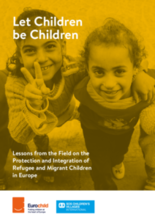INTRODUCTION TO THE COMPENDIUM OVERVIEW AND USE
Reflecting on real concerns about the situation of migrant and refugee children, Eurochild and SOS Children’s Villages International have mobilised members and partners in 12 countries to illustrate practices from across Europe on protecting their rights. The 16 case studies offer lessons from the ground on how services can ensure refugee and migrant children get the necessary protection and individualised support. They help gather learnings from interventions where the mainstream child protection services can provide quality family and community-based care to respond to the specific needs of refugee and migrant children, and identify outstanding challenges and gaps.
This publication is meant to be a useful resource to:
a) share practices and learning opportunities at local level
b) support (sub-)national and EU level advocacy in the field of refugee and migrant children for collective influencing
c) inform and promote a stronger rights-based approach to the EU’s migration agenda. This publication also aims to be a helpful tool to offer advice to policy makers on the investment priorities and long-term benefits of realising the rights of every child for society as a whole.
The publication uses a rights-based foundation and places the emphasis on engaging all actors to ensure respect of the rights of the child in the context of migration. It has a particular focus on supporting refugee and migrant children in order to prevent any form of violence. Furthermore, it stresses the need to foster their development and inclusion in society while providing adequate reception conditions and care meeting children’s individual needs.
All migrant and refugee children who arrive in Europe must be treated first and foremost as children. Therefore, their specific and individual needs as children must be addressed. They have the right to be protected and adults have the duty to protect them, in line with European values, international and European law on the rights of the child.
Integrated child protection systems that place the child at the centre, reflect the UNCRC, and ensure that all essential actors and systems – education, health, welfare, justice, civil society, community and family – work in concert, are needed to meet the specific needs of migrant and refugee children, and to prevent them from falling through the cracks.
The practical solutions and the learnings from the ground documented in this publication are expected to function as a source of inspiration for government and civil society actors to ensure that children arriving in Europe are assured a safe and nurturing environment for their full development.

